2019届高三英语上学期第一次月考试题
贵州省遵义航天高级中学2019届高三第一次模拟(月考)考试 英语试题(含详细答案)
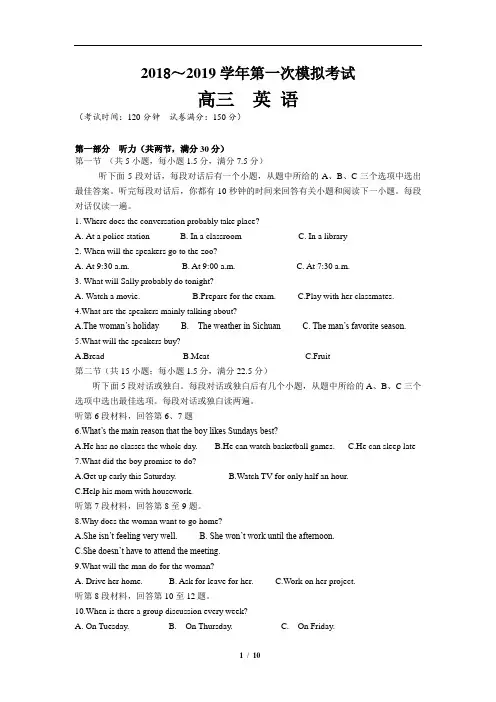
2018~2019学年第一次模拟考试高三英语(考试时间:120分钟试卷满分:150分)第一部分听力(共两节,满分30分)第一节(共5小题,每小题1.5分,满分7.5分)听下面5段对话,每段对话后有一个小题,从题中所给的A、B、C三个选项中选出最佳答案。
听完每段对话后,你都有10秒钟的时间来回答有关小题和阅读下一小题。
每段对话仅读一遍。
1. Where does the conversation probably take place?A.At a police stationB. In a classroomC. In a library2.When will the speakers go to the zoo?A.At 9:30 a.m.B. At 9:00 a.m.C. At 7:30 a.m.3.What will Sally probably do tonight?A.Watch a movie.B.Prepare for the exam.C.Play with her classmates.4.What are the speakers mainly talking about?A.The woman’s holidayB. The weather in SichuanC. The man’s favorite season.5.What will the speakers buy?A.BreadB.MeatC.Fruit第二节(共15小题;每小题1.5分,满分22.5分)听下面5段对话或独白。
每段对话或独白后有几个小题,从题中所给的A、B、C三个选项中选出最佳选项。
每段对话或独白读两遍。
听第6段材料,回答第6、7题6.What’s the main reason that the boy likes Sundays best?A.He has no classes the whole day.B.He can watch basketball games.C.He can sleep late7.What did the boy promise to do?A.Get up early this Saturday.B.Watch TV for only half an hour.C.Help his mom with housework.听第7段材料,回答第8至9题。
陕西省西安市远东第一中学近年届高三英语10月月考试题(2021年整理)
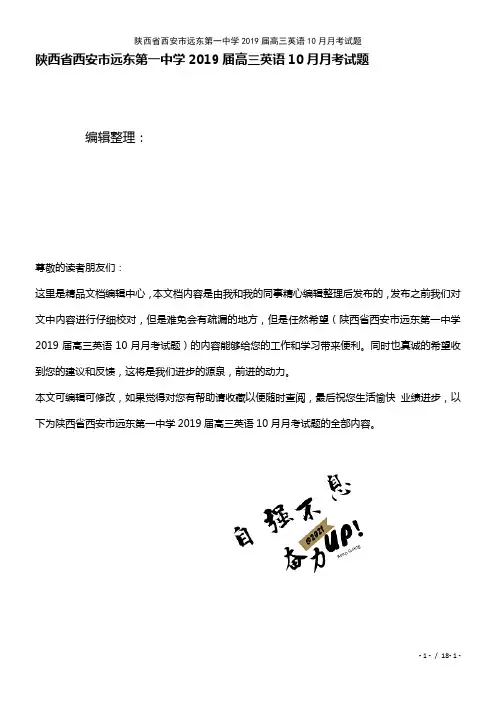
陕西省西安市远东第一中学2019届高三英语10月月考试题编辑整理:尊敬的读者朋友们:这里是精品文档编辑中心,本文档内容是由我和我的同事精心编辑整理后发布的,发布之前我们对文中内容进行仔细校对,但是难免会有疏漏的地方,但是任然希望(陕西省西安市远东第一中学2019届高三英语10月月考试题)的内容能够给您的工作和学习带来便利。
同时也真诚的希望收到您的建议和反馈,这将是我们进步的源泉,前进的动力。
本文可编辑可修改,如果觉得对您有帮助请收藏以便随时查阅,最后祝您生活愉快业绩进步,以下为陕西省西安市远东第一中学2019届高三英语10月月考试题的全部内容。
西安市远东第一中学2018-2019学年度第一学期高三年级10月月考英语试题第一部分:听力(共两节.满分30分)听下面5段对话。
每段对话后有一个小题,从题中所给的A、B、C三个选项中选出最佳选项,并标在试卷的相应位置。
听完每段对话后,你都有10秒钟的时间来回答有关小题和阅读下一小题.每段对话仅读一遍。
1. How will the speakers travel?A. By ferry. B。
By sea bus. C. By train。
2。
Why does the woman believe the weatherman?A. She sees brown grass。
B。
The plants are dying. C. He is always right.3. What are the speakers mainly talking about?A. Birds。
B。
Trees. C. Seasons。
4。
Who is making the noise?A. A baby. B。
A cat. C. A man.5. Which movie will the speakers probably see?A. A or B。
B. Avengers。
天津一中2020届高三上学期第一次月考英语试题 PDF版含答案
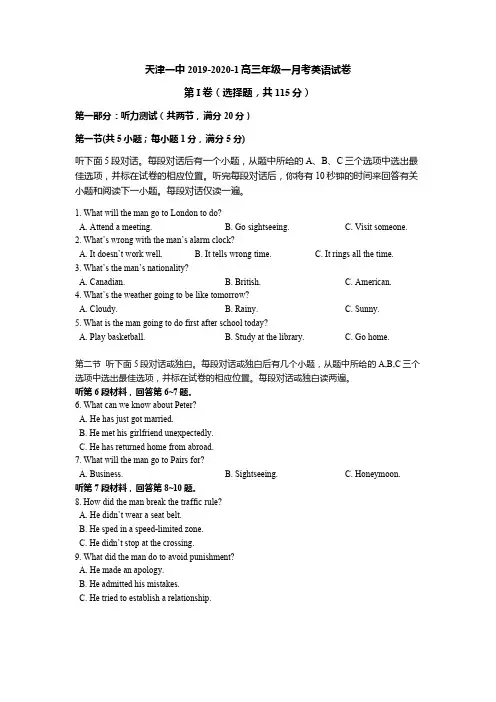
天津一中2019-2020-1高三年级一月考英语试卷第I卷(选择题,共115分)第一部分:听力测试(共两节,满分20分)第一节(共5小题;每小题1分,满分5分)听下面5段对话。
每段对话后有一个小题,从题中所给的A、B、C三个选项中选出最佳选项,并标在试卷的相应位置。
听完每段对话后,你将有10秒钟的时间来回答有关小题和阅读下一小题。
每段对话仅读一遍。
1.What will the man go to London to do?A.Attend a meeting.B.Go sightseeing.C.Visit someone.2.What’s wrong with the man’s alarm clock?A.It doesn’t work well.B.It tells wrong time.C.It rings all the time.3.What’s the man’s nationality?A.Canadian.B.British.C.American.4.What’s the weather going to be like tomorrow?A.Cloudy.B.Rainy.C.Sunny.5.What is the man going to do first after school today?A.Play basketball.B.Study at the library.C.Go home.第二节听下面5段对话或独白。
每段对话或独白后有几个小题,从题中所给的A,B,C三个选项中选出最佳选项,并标在试卷的相应位置。
每段对话或独白读两遍。
听第6段材料,回答第6~7题。
6.What can we know about Peter?A.He has just got married.B.He met his girlfriend unexpectedly.C.He has returned home from abroad.7.What will the man go to Pairs for?A.Business.B.Sightseeing.C.Honeymoon.听第7段材料,回答第8~10题。
最新2020届高三英语10月月考试题(含解析)
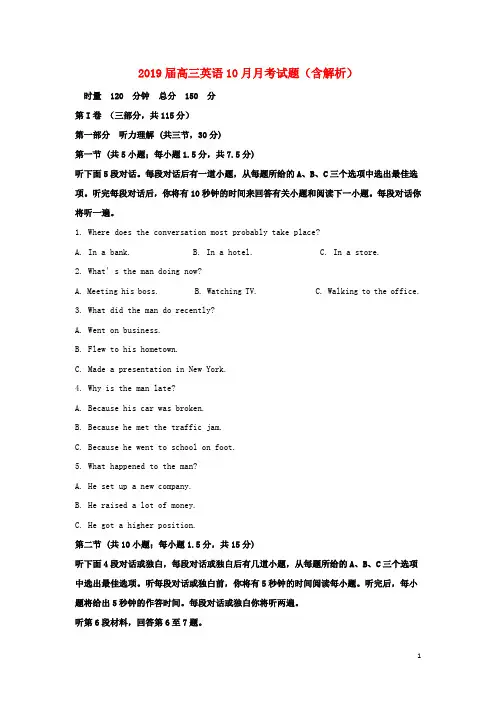
2019届高三英语10月月考试题(含解析)时量 120 分钟总分 150 分第I卷(三部分,共115分)第一部分听力理解 (共三节,30分)第一节 (共5小题;每小题1.5分,共7.5分)听下面5段对话。
每段对话后有一道小题,从每题所给的A、B、C三个选项中选出最佳选项。
听完每段对话后,你将有10秒钟的时间来回答有关小题和阅读下一小题。
每段对话你将听一遍。
1. Where does the conversation most probably take place?A. In a bank.B. In a hotel.C. In a store.2. What’s the man doing now?A. Meeting his boss.B. Watching TV.C. Walking to the office.3. What did the man do recently?A. Went on business.B. Flew to his hometown.C. Made a presentation in New York.4. Why is the man late?A. Because his car was broken.B. Because he met the traffic jam.C. Because he went to school on foot.5. What happened to the man?A. He set up a new company.B. He raised a lot of money.C. He got a higher position.第二节 (共10小题;每小题1.5分,共15分)听下面4段对话或独白,每段对话或独白后有几道小题,从每题所给的A、B、C三个选项中选出最佳选项。
听每段对话或独白前,你将有5秒钟的时间阅读每小题。
听完后,每小题将给出5秒钟的作答时间。
2019届上海市七宝中学高三上学期10月月考英语试卷及答案
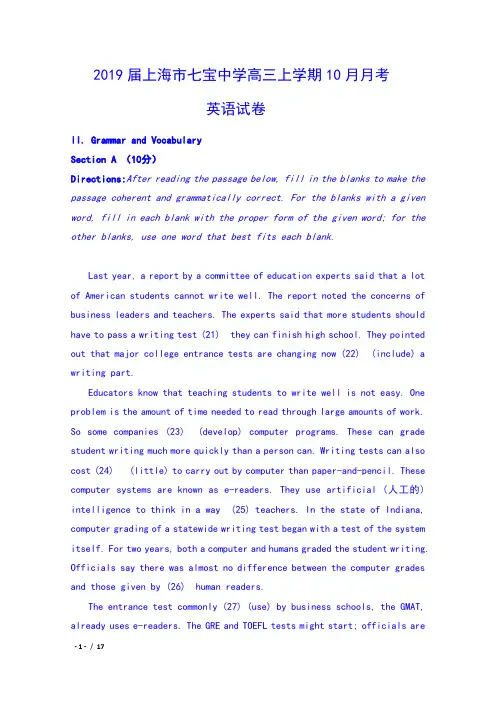
2019届上海市七宝中学高三上学期10月月考英语试卷II. Grammar and VocabularySection A (10分)Directions:After reading the passage below, fill in the blanks to make the passage coherent and grammatically correct. For the blanks with a given word, fill in each blank with the proper form of the given word; for the other blanks, use one word that best fits each blank.Last year, a report by a committee of education experts said that a lot of American students cannot write well. The report noted the concerns of business leaders and teachers. The experts said that more students should have to pass a writing test (21) they can finish high school. They pointed out that major college entrance tests are changing now (22) (include) a writing part.Educators know that teaching students to write well is not easy. One problem is the amount of time needed to read through large amounts of work. So some companies (23) (develop) computer programs. These can grade student writing much more quickly than a person can. Writing tests can also cost (24) (little) to carry out by computer than paper-and-pencil. These computer systems are known as e-readers. They use artificial (人工的) intelligence to think in a way (25) teachers. In the state of Indiana, computer grading of a statewide writing test began with a test of the system itself. For two years, both a computer and humans graded the student writing. Officials say there was almost no difference between the computer grades and those given by (26) human readers.The entrance test commonly (27) (use) by business schools, the GMAT, already uses e-readers. The GRE and TOEFL tests might start; officials aredeciding. The GRE is the Graduate Record Examination. TOEFL is the Test of English as a Foreign Language.Systems (28) (use) to grade writing in college classes. The computers read a few hundred examples of student writing already graded by humans. Then the systems compare new writings against those already examined.Some teachers say it can never really understand (29) a writer is trying to say. Critics say a program cannot follow a thought or judge humor or understand a beautifully expressed idea.But inventors of the programs say computer grading guarantees that each piece of writing is graded in the same way. They also say the systems (30) (mean) to judge knowledge more than creativity.Section B (10分)Directions:Fill in each blank with a proper word chosen from the box. Each word can be used only once. Note that there is one word more than you need.Botany, the study of plants, occupies a ____31____ position in the history of human knowledge. For many thousands of years it was the one field of awareness about which humans had anything more than the vaguest (含糊的) of insight. It is impossible to know today just what our Stone Age ancestors knew about plants, but from what we can observe of pre-industrial societies that still exist, a detailed learning of plants and their properties must extremely ancient. This is ___32_____. Plants are the basis of the food ____33____ for all living things, even for other plants. They have always been enormously important to the welfare of peoples, not only for food, but also for clothing, weapons, tools, eyes, medicines, shelter,。
江苏高考英语百日训练之任务型阅读(82)含答案解析
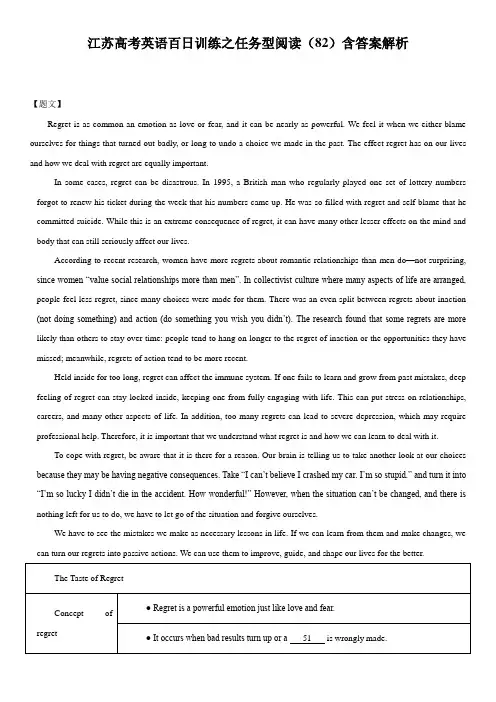
江苏高考英语百日训练之任务型阅读(82)含答案解析【题文】Regret is as common an emotion as love or fear, and it can be nearly as powerful. We feel it when we either blame ourselves for things that turned out badly, or long to undo a choice we made in the past. The effect regret has on our lives and how we deal with regret are equally important.In some cases, regret can be disastrous. In 1995, a British man who regularly played one set of lottery numbers forgot to renew his ticket during the week that his numbers came up. He was so filled with regret and self-blame that he committed suicide. While this is an extreme consequence of regret, it can have many other lesser effects on the mind and body that can still seriously affect our lives.According to recent research, women have more regrets about romantic relationships than men do—not surprising, since women “value social relationships more than men”. In collectivist culture where many aspects of life are arranged, people feel less regret, since many choices were made for them. There was an even split between regrets about inaction (not doing something) and action (do something you wish you didn’t). The research found that some regrets are more likely than others to stay over time: people tend to hang on longer to the regret of inaction or the opportunities they have missed; meanwhile, regrets of action tend to be more recent.Held inside for too long, regret can affect the immune system. If one fails to learn and grow from past mistakes, deep feeling of regret can stay locked inside, keeping one from fully engaging with life. This can put stress on relationships, careers, and many other aspects of life. In addition, too many regrets can lead to severe depression, which may require professional help. Therefore, it is important that we understand what regret is and how we can learn to deal with it.To cope with regret, be aware that it is there for a reason. Our brain is telling us to take another look at our choices because they may be having negative consequences. Take “I can’t believe I crashed my car. I’m so stupid.” and turn it into “I’m so lucky I didn’t die in the accident. How wonderful!” However, when the situation can’t be changed, and there is nothing left for us to do, we have to let go of the situation and forgive ourselves.We have to see the mistakes we make as necessary lessons in life. If we can learn from them and make changes, we can turn our regrets into passive actions. We can use them to improve, guide, and shape our lives for the better.【答案】51. choice52. Factors/Elements53. more 54. missed55. Effects/ Influences/Impacts56. cost 57. mentally/psychologically58. exist 59. gratefulness/thankfulness/gratitude60. beyond【解析】本文为说明文。
2019届湖北省荆门市龙泉中学高三12月月考英语试题(PDF版)
龙泉中学2019届高三年级12月月考英语试卷第一部分:听力(共两节, 满分30分)做题时, 先将答案划在试卷上。
录音内容结束后, 你将有两分钟的时间将试卷上的答案转涂到答题卡上。
第一节(共5小题;每小题1.5分,满分7.5分)听下面五段对话。
每段对话后有一个小题,从题中所给的A、B、C三个选项中选出最佳选项,并标在试卷相应位置。
听完每段对话后,你都有10秒钟的时间来回答有关小题和阅读下一小题。
每段对话仅读一遍。
1. What does the man mean?A. He works part-time.B. He is out of work.C. He is tired of his work.2. What’s Anna?A. A housewife.B. A librarian.C. A hotel clerk.3. What are the speakers talking about?A. A party.B. A weekend.C. A person.4. Why does the man like the new coffee bar?A. Because of the prices.B. Because of the service.C. Because of the position.5. What does the man suggest the woman do?A. Spend more time touring.B. Travel around another day.C. Meet him soon.第二节(共15小题;每小题1.5分,满分22.5分)听下面5段对话或独白。
每段对话或独白后有几个小题,从题中所给的A、B、C三个选项中选出最佳选项,并标在试卷的相应位置。
听每段对话或独白前,你将有时间阅读各个小题,每小题5秒钟;听完后,各个小题将给出5秒钟的作答时间。
黑龙江省哈尔滨市第九中学2019届高三上学期十月月考英语试卷
哈尔滨市第九中学髙三上学期十月月考 ,英语试卷第I 卷(总分100分)第一部分:听力测试 <共两节,满分30分)笫一节共5小應:毎小题1.5分,满分7.5分>听下面5段对话•每段对话后齐一个小娌,从逝中所给的A. B. C =个选项中选出最佳选项,并标在试卷的相应位钾,听完侮段对话后,你部舟丨〇秒钟的时间宋问答•有关小班和阅读下一小應•每段对诂仅读遍…1. Who moved into the boy's house?A. His sister. 13. His mother. C. His grandmother.2. What docs the woman want the man to do?A. Make a cake.B. l >〇 some shopping 3. What arc the speakers talking about in general?A. A teacher.B. A class.4. What does the boy get from his mum for his birthday?A. Some money.B. A phone 5. How will the girl get to her friend's house?A. On foot.B. By bike.第二节(共15小题:每小题1.5分,满分22.5分)听下而5段对话成独白,每段对诂成独自后苻几个小题,从题中所给的A, B, C 三个选项中选山最佳选项,并标在试卷的相应位置…听每段对话或独白前,你将有时间阅读各小勘,每小题5秒钟;听宂后,各小题将给出5秒钟的作答时间•每段对话戒独白读两迪s听第6段材料,问答第6至7逝.6. What does Chris like doing?A. Climbing.B. Sailing.C. Skiing.7. What team is Laura in?A. The football team.B. TTic volleybalheam,C. The basketball (cam.听笫7段材料,回答第8至9題.8. W hat does the woman say about the boy from Haiti?A. He was sick yesterday.B. He didn't pass his English exam,C. He has difficulty communicating with other students.9. What docs the woman think of helping the boy?A. Hard.B. Exciting.C. Time-wasting.听第8段材料,回答第丨〇负12通,10. Where did the woman meet Kevin?A. On an underground train.B. At a restaurant.C. In the street.11. What do we know about the woman?C. Pick up her classmates.C. A friend.C. A bike.C, By car.C. It shows sports colors.C. The photograph.八.She mistook Kevin.B. She met Kevin before.C. She had dinner with Kevin.12. How did the woman probably feci in the end?A. Angry.B. Embarrassed.C. Surprised.听第9段材料,回答第丨3至16题.13. Why do llie speakers decide to make the notice black and while in the end?A. It is simple.B. It saves money.14. W hat will be put in the center of the notice?A. The date and the time.B. The school name.15. W hat photograph do the speakers choose?A. The one of the football team.B. The one of the baseball team.C. The one of the basketball team.16. What will the speaker do in the afternoon?A. Decide the words.B. Draw a simple copy.C. Buy a bigger piece of paper.听笫丨0段材料,回答第丨7至20歴。
2019届高三英语上学期第一次月考试题(含解析)
学习资料专题2019届第一次月考英语试卷第Ⅰ卷第一部分听力(共两节,满分30分)第一节(共5小题;每小题1.5分,满分7.5分)听下面5段对话。
每段对话后有一个小题,从题中所给的A、B、C三个选项中选出最佳选项,并标在试卷的相应位置。
听完每段对话后,你都有10秒钟的时间来回答有关小题和阅读下一小题。
每段对话仅读一遍。
1. What does the man try to do?A. Ask the waiter for help.B. Clean the woman’s clothes.C. Get the woman more tea.2. What did the man forget to do?A. Finish his research.B. Pay for the Internet.C. Fix the computer.3. What did the man probably learn in France?A. Painting.B. Engineering.C. Cooking.4. How does the man probably feel?A. Satisfied.B. Relaxed.C. Anxious.5. Where might Tony be today?A. At home.B. On the playground.C. In another classroom.第二节(共15小题;每小题1.5分,满分22.5分)听下面5段对话或独白。
每段对话或独白后有几个小题,从题中所给的A、B、C三个选项中选出最佳选项,并标在试卷的相应位置。
听每段对话或独白前,你将有时间阅读各个小题,每小题5秒钟;听完后,各小题将给出5秒钟的作答时间。
每段对话或独白读两遍。
听第6段材料,回答第6、7题。
6. What does the woman want to do?A. Play soccer.B. Play some music.C. Watch a game.7. What does the man usually do first when he gets home?A. He has something to eat.B. He practices the guitar.C. He does his homework.听第7段材料,回答第8至10题。
西藏拉萨北京实验中学2019届高三英语上学期第一次月考试题
2018—2019学年高三第一次月考(英语)试卷注意事项:1.本试卷满分150分,考试吋间120分钟。
2.本试卷共8页,如遇缺页、漏页、字迹不清等,考生须及时报告监考老师。
3.命题人:第[卷(105分)第一部分听力(共两节,满分30分,每小题1・5分)做题时,先将答案标在试卷上。
录音内容结束后,你将有两分钟的时间将试卷上的答案转涂到答题卡上。
第一节(共5小题:每小题1.5分,满分7.5分)听下面5段对话。
每段对话后有一个小题,从题中所给的A、B、C三个选项中选出最佳选项,并标在试卷的相应位置。
听完每段对话后,你都有10秒钟的时间来冋答有关小题和阅读下一小题每段对话仅读一遍。
1.W.hat are the speakers talking about?A.An article in the newspaper.B. A meeting with the president. C・ A speech on television.2.What is the change?A.$0. 50B. $0. 75C. $3. 253.What does the man mean?A.They don, t have to arrive for the Brown, s lunch on time.B.It, s impolite to be late for the Brown, s lunch.C.They don' t have to have manners in Franee.4・ What does the man say about his country?A.It is cold.B. It is hot.C. It is rainy.5. What is the boy going to do today?A・ Watch a footbal 1 game. B. Go to see a doctor. C. Cal 1 his head teacher. 第二节(共15小题;每小题1・5分,满分22.5分)听下面5段材料。
- 1、下载文档前请自行甄别文档内容的完整性,平台不提供额外的编辑、内容补充、找答案等附加服务。
- 2、"仅部分预览"的文档,不可在线预览部分如存在完整性等问题,可反馈申请退款(可完整预览的文档不适用该条件!)。
- 3、如文档侵犯您的权益,请联系客服反馈,我们会尽快为您处理(人工客服工作时间:9:00-18:30)。
浙江省杭州市建人高复2019届高三英语上学期第一次月考试题本试卷分第I卷(选择题)和第II卷(非选择题)两部分。
第I卷第一部分听力(共两节,满分30分)做题时,先将答案标在试卷上。
录音内容结束后,你将有两分钟的时间将试卷上的答案转涂到答题卡上。
第一节(共5小题;每小题1.5分,满分7.5分)听下面5段对话。
每段对话后有一个小题,从题中所给的A、B、C三个选项中选出最佳选项,并标在试卷的相应位置。
听完每段对话后,你都有10称钟的时间来回答有关小题和阅读下一小题。
每段对话仅读一遍。
1.When does the man say the lecture will begin?A.At 7:30B.At 8:00C.At 7:402.Where does the conversation most probably take place?A.At the post officeB.At the airportC.At the hospital3.What are the two speakers talking about??A. A big travel companyB. A job opportunityC.An inexperienced salesman4.What does the man mean?A.Bill isn’t ready to help othersB.Bill doesn’t want to listen to himC.Bill is actually in need of help himself5.What does John think of his holiday?A.WonderfulB.AwfulC.Boring第二节(共15小题:每小题1.5分,满分22.5分)听下面5段对话或独白。
每段对话或独白后有几个小题,从题中所给的A、B、C三个选项中选出最佳选项,并标在试卷的相应位置。
听每段对话或独白前,你将有时间阅读各个小题,每小题5秒钟;听完后,各小题将给出5秒钟的作答时间。
每段对话或独白读两遍。
听第6段材料,回答第6-7题。
6.Why didn’t the woman show up for class?A.She met a traffic accidentB.She talked with the manC.There was something wrong with her car7.What will the woman probably do?A.Have her car repairedB.Rent a carC.Buy a new car听第7段材料,回答第8-9题。
8.Where does the woman live?A.In a small townB.In a big cityC.In a mountain village9.What do we know about the potluck supper?A. A meal at the seasideB. A meal indoorsC.Something like a picnic听第8段材料,回答第10-12题。
10.What will the woman do on the weekend?A.Attend a partyB.Take a holidayC.Go on a business trip11.When does the woman plan to arrive?te FridayB.Mid SaturdayC.Early Saturday12.Why will the woman take a sweater or a light coat?A.Because it can be windy at nightB.Because it can be rainy at nightC.Because it can be cold at night听第9段材料,回答第13-16题。
13.When did the football match begin?A. A moment agoB.Half an hour agoC.After they arrived14.Who gave a long shot, but missed the goal?A.No. 3 on the red teamB.No. 9 on the red teamC.No. 5 on the white team15.What is the score of the football match?A.2:2B.0:2C.0:016.What do the two speakers think of the match?A.They both think it is just so-soB.They both think it is excellentC.One of them doesn’t think it is exciting听第10段材料,回答第17-20题。
17.Why did the police stop the man’s car?A.Because he drove after drinkingB.Because he had a car accidentC.Because he didn’t care about the traffic lights18.How did he drive home after being tested?A.The police allowed him to drive homeB.He drove home when the police were not thereC.He told his son to come and drive him home19.How many policemen came to the man’s home the next day?A.TwoB.ThreeC.Four20.Why did the police ask the man where his car was?A.Because the man has stolen a police carB.Because the man’s car had hit the police’s carC.Because the man had driven the police’s car home第二部分阅读理解(共两节,满分35分)第一节(共10小题;每小题2.5分,满分25分)AWashington, D. C Bicycle ToursCherry Blossom Bike Tour in Washington, D.C.Duration: 3 hoursThis small group bike tour is a fantastic way to see the world famous cherry trees with beautiful flowers of Washington,D.C. Your guide will provide a history lesson about the trees and the famous monuments where they blossom. Reserve your spot before availability-and the cherry blossoms-disappear!Washington Capital Monuments Bicycle TourDuration: 3 hours (4 miles)Join a guided bike tour and view some of the most popular monuments in Washington, D.C. Explore the monuments and memorials on the National Mall as your guide shares unique facts and history at each stop. Guided tour includes bike, helmet, cookies and bottled water. Capital City Bike Tour in Washington, D. CDuration: 3 hoursMorning or Afternoon, this bike tour is the perfect tour for D. C. newcomers and locals looking to experience Washington, D.C. in a healthy way with minimum effort. Knowledgeable guides will entertain you with the most interesting stories about Presidents,Congress, memorials, and parks. Comfortable bikes and a smooth tour route(路线)make cycling between the sites fun and relaxing.Washington Capital Sites at Night Bicycle TourDuration: 3 hours (7 miles)Join a small group bike tour for an evening of exploration in the heart of Washington, D.C. Get up close to the monuments and memorials as you bike the sites of Capitol Hill and the National Mall. Frequent stops are made for photo taking as your guide offers unique facts and history. Tour includes bike, helmet, and bottled water. All riders are equipped with reflective vests and safety lights.21. Which tour do you need to book in advance?A Cherry Blossom Bike Tour in Washington, D.C.B. Washington Capital Monuments Bicycle Tour.C. Capital City Bike Tour in Washington,D. CD. Washington Capital Sites at Night Bicycle Tour.22. What will you do on the Capital City Bike Tour?A. Meet famous people.B. Go to a national park.C. Visit well-known museums.D. Enjoy interesting stories.23. Which of the following does the bicycle tour at night provide?A. City maps.B. Cameras.C. Meals.D. Safety lights.BIn the 1760s, Mathurin Roze opened a series of shops that boasted(享有)a special meat soup called consomme. Although the main attraction was the soup, Roze's chain shops also set a new standard for dining out, which helped to establish Roze as the inventor of the modern restaurant.Today, scholars have generated large amounts of instructive research about restaurants. Take visual hints that influence what we eat: diners served themselves about 20 percent more pasta(意大利面食)when their plates matched their food. When a dark-colored cake was served on a black plate rather than a white one, customers recognized it as sweeter and more tasty.Lighting matters, too. When Berlin restaurant customers ate in darkness, they couldn't tell how much they'd had: those given extra-large shares ate more than everyone else, but were none the wiser—they didn’t feel fuller, and they were just as ready for dessert.Time is money, but that principle means different things for different types of restaurants. Unlike fast-food places, fine dining shops prefer customers to stay longer and spend. One way to encourage customers to stay and order that extra round: put on some Mozart(莫扎特).When classical, rather than pop, music was playing, diners spent more. Fast music hurried diners out. Particular scents also have an effect: diners who got the scent of lavender(薰衣草)stayed longer and spent more than those who smelled lemon, or no scent.Meanwhile, things that you might expect to discourage spending—"bad" tables, crowding,high prices — don't necessarily. Diners at bad tables — next to the kitchen door, say —spent nearly as much as others but soon fled. It can be concluded that restaurant keepers need not "be overly concerned about ‘bad' tables," given that they're profitable. As for crowds,a Hong Kong study found that they increased a restaurant's reputation, suggesting great food at fair prices. And doubling a buffet's price led customers to say that its pizza was 11 percent tastier.24. The underlined phrase "none the wiser" in paragraph 3 most probably implies that thecustomers were .A. not aware of eating more than usualB. not willing to share food with othersC. not conscious of the food qualityD. not fond of the food provided25. How could a fine dining shop make more profit?A. playing classical music.B. Introducing lemon scent.C. Making the light brighter,D. Using plates of larger size.26. What does the last paragraph talk about?A. Tips to attract more customers.B. Problems restaurants are faced with.C. Ways to improve restaurants' reputation.D. Common misunderstandings about restaurants.CLanguages have been coming and going for thousands of years, but in recent times there has been less coming and a lot more going. When the world was still populated by hunter-gatherers,small,tightly knit(联系)groups developed their own patterns of speech independent of each other. Some language experts believe that 10,000 years ago, when the world had just five to ten million people, they spoke perhaps 12, 000 languages between them.Soon afterwards, many of those people started settling down to become farmers, and their languages too became more settled and fewer in number. In recent centuries, trade, industrialisation, the development of the nation-state and the spread of universal compulsory education, especially globalisation and better communications in the past few decades, all have caused many languages to disappear, and dominant languages such as English,Spanish and Chinese are increasingly taking over.At present, the world has about 6, 800 languages. The distribution of these languages is hugely uneven. The general rule is that mild zones have relatively few languages, often spoken by many people, while hot wet zones have lots, often spoken by small numbers. Europe has only around 200 languages; the Americas about 1, 000; Africa 2, 400; and Asia and the Pacific perhaps3,200, of which Papua New Guinea alone accounts for well over 800.The median number(中位数) of speakers is mere 6,000, which that half the world's languages are spoken by fewer people than that.Already well over 400 of the total of 6, 800 languages are close to extinction (消亡), with only a few elderly speakers left. Pick, at random, Busuu in Cameroon (eight remaining speakers), Chiapaneco in Mexico (150), Lipan Apache in the United States (two or three) or Wadjigu in Australia (one, with a question-mark): none of these seems to have much chance of survival.27. What can we infer about languages in hunter-gatherer times?A. They developed very fastB. They were large in numberC. They had similar patternsD. They were closely connected28. Which of the following best explains "dominant" underlined in paragraph 2?A. ComplexB. AdvancedC. Powerful.D. Modern29. How many languages are spoken by less than 6,000 people at present?A. About 6,800B, About 3,400C. About 2,400D. About 1,20030. What is the main idea of the text?A. New languages will be created.B. People's lifestyles are reflected in languages.C. Human development results in fewer languages.D Geography determines language evolution.第二节(共5小题;每小题2分,满分10分)根据短文内容,从短文后的选项中选出能填入空白处的最佳选项。
